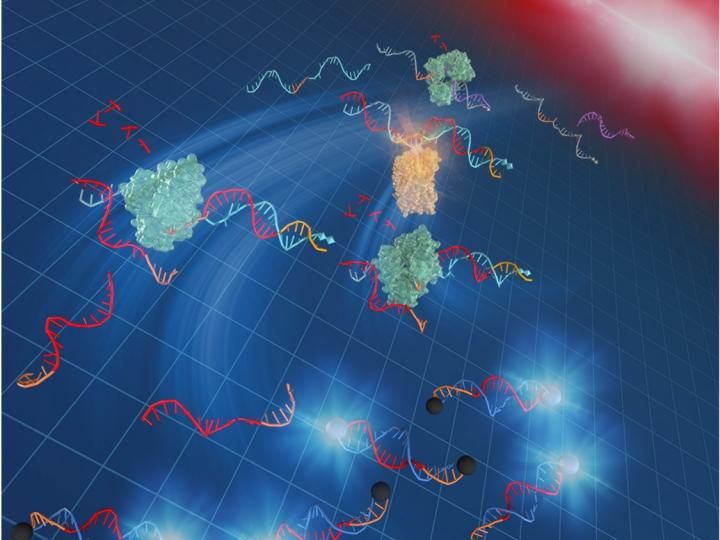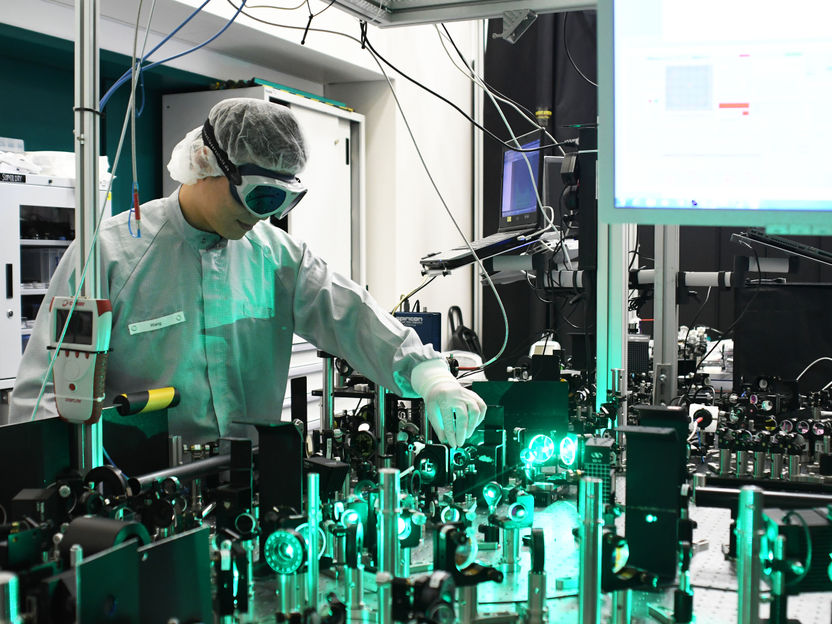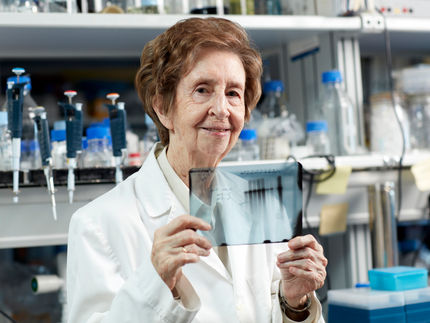A rapid, easy-to-use DNA amplification method at 37°C
Study could advance molecular diagnosis and robotics
Scientists in Japan have developed a way of amplifying DNA on a scale suitable for use in the emerging fields of DNA-based computing and molecular robotics. By enabling highly sensitive nucleic acid detection, their method could improve disease diagnostics and accelerate the development of biosensors, for example, for food and environmental applications.

A DNA strand (purple) primes exponential amplification of DNA (red) as signals for directing light emission of DNA nanodeveices.
Organic and Biomolecular Chemistry
Researchers from Tokyo Institute of Technology (Tokyo Tech), Abbott Japan Co., Ltd, and the University of Electro-Communications, Japan, report a way to achieve million-fold DNA amplification and targeted hybridization that works at body temperature (37°C/98.6°F).
The method, named L-TEAM (Low-TEmperature AMplification), is the result of more than five years of research and offers several advantages over traditional PCR, the dominant technique used to amplify DNA segments of interest.
With its easy-to-use, 'one-pot' design, L-TEAM avoids the need for heating and cooling steps and specialized equipment usually associated with PCR. That means it is an efficient, inexpensive method that can importantly prevent protein denaturation, thereby opening a new route to real-time analysis of living cells.
In their study published in Organic & Biomolecular Chemistry, the researchers introduced synthetic molecules called locked nucleic acids (LNAs) into the DNA strands, as these molecules are known to help achieve greater stability during hybridization.
The addition of LNA led to an unexpected, but beneficial, outcome. The team observed a reduced level of "leak" amplification, a type of non-specific amplification that has long been an issue in DNA amplification studies as it can lead to an error in disease diagnosis, that is, a false positive.
"We were surprised to discover the novel effect of LNA in overcoming the common leak problem in DNA amplification reactions," says Ken Komiya, assistant professor at Tokyo Tech's School of Computing. "We plan to investigate the mechanisms behind leak amplification in detail and further improve the sensitivity and speed of L-TEAM."
In the near future, the method could be used to detect short nucleic acids such as microRNA for medical diagnostics. In particular, it could facilitate point-of-care testing and early disease detection. MicroRNAs are now increasingly recognized as promising biomarkers for cancer detection and may hold the key to uncovering many other aspects of human health and environmental science.
In addition, Komiya explains that L-TEAM paves the way to practical use of DNA computing and DNA-controlled molecular robotics. "The original motivation behind this work was the construction of a novel amplified module that is essential to build advanced molecular systems," he says. "Such systems could provide insights into the operational principle behind living things."
Original publication
Other news from the department science

Get the life science industry in your inbox
By submitting this form you agree that LUMITOS AG will send you the newsletter(s) selected above by email. Your data will not be passed on to third parties. Your data will be stored and processed in accordance with our data protection regulations. LUMITOS may contact you by email for the purpose of advertising or market and opinion surveys. You can revoke your consent at any time without giving reasons to LUMITOS AG, Ernst-Augustin-Str. 2, 12489 Berlin, Germany or by e-mail at revoke@lumitos.com with effect for the future. In addition, each email contains a link to unsubscribe from the corresponding newsletter.
Most read news
More news from our other portals
Last viewed contents

12 Free Tips Help Keep Test Weights Accurate -
Sacrum
Scurvy
Agilent Technologies to acquire Advanced Analytical Technologies, Inc.
Fairy_ring




















































